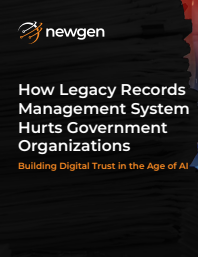How Legacy Records Management Systems Hurt Government Organizations
Government organizations are responsible for managing massive volumes of public records that support transparency, accountability, and service delivery. But many of these records still live in outdated repositories and legacy archives built decades ago, long before citizen expectations shifted to digital and self-service. These older systems may have once served their purpose, but today they hold back modernization goals, strain budgets, and increase risk across departments.
This whitepaper explores how outdated records management systems are harming government efficiency and what capabilities agencies must prioritize to ensure secure, scalable, and future-ready governance.
The Growing Cost and Complexity of Public Records
Public sector organizations worldwide are facing a dramatic rise in information volume. Agencies are expected to maintain and retrieve everything from operational documents to legal evidence and public correspondences. The scale has increased sharply in recent years, driven by digital citizen interactions and policy transparency.
For example, jurisdictions globally are reporting exponential growth in public records requests. Yet, legacy systems cannot handle these modern demands. Manual processes and slow retrieval not only delay responses but also increase the cost of fulfilling legal obligations. Governments end up spending more time and money correcting issues that originate from outdated systems.
Where Legacy RMS Systems Create the Most Damage?
The impact of aging systems is not limited to inconvenience. Key operational pain points include:
- Information silos that disconnect departments and delay everyday decisions
- Lack of integration with modern collaboration and workflow tools
- Duplicate and inconsistent data that undermines operational reporting
- Slow search and retrieval, making citizens wait longer for services
- High maintenance costs to keep outdated systems running
- Manual record transfers that waste staff time and increase error risk
These inefficiencies weaken public trust and limit how quickly agencies can respond to new policy mandates or emergencies.
Compliance and Security Risks Increase Daily
Government agencies must adhere to strict regulatory standards for retention, privacy, and auditability. Legacy systems make it difficult to demonstrate:
- Proper retention and defensible deletion
- Full audit trails for sensitive record activities
- Secure access controls aligned to roles and clearance
- Document authenticity for legal reviews
Even a single compliance lapse can result in reputational damage, increased supervision, or penalties. Security concerns also rise as unsupported software becomes a target for breaches and ransomware attacks.
The Bottleneck Affecting Citizen Services
Public-facing delays are the most visible consequence of legacy records systems. When information is slow to locate or validate, citizen outcomes suffer. Delays in processing healthcare paperwork, benefits, land records, or building approvals directly impact quality of life. Agencies also struggle to:
- Track case progress
- Provide status updates
- Respond consistently
- Deliver fully digital experiences
Citizens often need to submit the same information multiple times because systems do not communicate with each other. Frustration rises, and confidence declines.
Remote Work Challenges Expose Weak Systems Further
Recent years have forced hybrid and distributed operations into the spotlight. Government staff working remotely often discovered that legacy RMS tools:
- Cannot be accessed securely from outside offices
- Lack mobile and cloud capabilities
- Require manual print-scan processes that increase backlogs
This made it clear that modernization is necessary for essential service continuity, especially when disruptions occur.
Why Modernization Is Hard to Delay Any Longer?
Digital governance priorities are advancing rapidly, from electronic signatures and open data initiatives to automation mandates. Agencies that fail to modernize their RMS fall behind on:
- Data-driven decision-making
- Shared service models across departments
- National and regional transformation strategies
- Citizen satisfaction targets
Funding constraints and risk aversion have delayed upgrades for years, but continuing to invest in outdated tools is no longer sustainable.
What a Modern Records Management System Must Provide?
A future-ready RMS ensures visibility, compliance, and effortless access to information across the enterprise. The whitepaper highlights essential capabilities:
- Centralized Records Governance
A single system where information is captured, validated, and managed from creation to disposition. - Intelligent Search and Metadata
Fast and accurate record retrieval supported by structured metadata and automated tagging. - Strong Compliance Controls
Built-in records retention, secure access permissions, and transparent audit logging. - Secure Cloud Enablement
Scalable infrastructure with disaster recovery support and reduced IT overhead. - Integration Across Department Systems
Seamless communication with content services, workflow automation, and citizen service applications. - Digital Self-Service Enablement
Support for eGovernment initiatives with online access to authenticated documents.
With these capabilities, information stops being an operational burden and becomes a strategic asset.
The Operational Benefits of Modernization
When agencies upgrade from legacy RMS, they see measurable improvements:
- Reduced record processing time
- Faster responses to citizen requests
- Higher staff productivity
- Stronger compliance and reduced legal exposure
- Lower IT operating costs
- Increased transparency and trust
Better systems create better outcomes at every level of government.
How Newgen Helps Governments Transform Records Management?
Newgen provides a unified digital platform that supports both physical and electronic records at scale. With secure cloud deployment options, intelligent automation, and centralized governance capabilities, Newgen helps agencies eliminate manual bottlenecks and legacy data challenges. Information becomes easier to manage, easier to protect, and easier to use in delivering faster and more credible public services.
Better Records, Better Governance
Government transformation depends on accurate, secure, and accessible information. Legacy records systems were not built for the digital age and cannot keep up with the demands of modern service delivery. Upgrading to a smarter RMS allows agencies to operate with confidence, strengthen accountability, and improve citizen outcomes.
Modernization is not only about efficiency. It protects the public interest and empowers governments to serve with agility and transparency. The time to begin is now.

